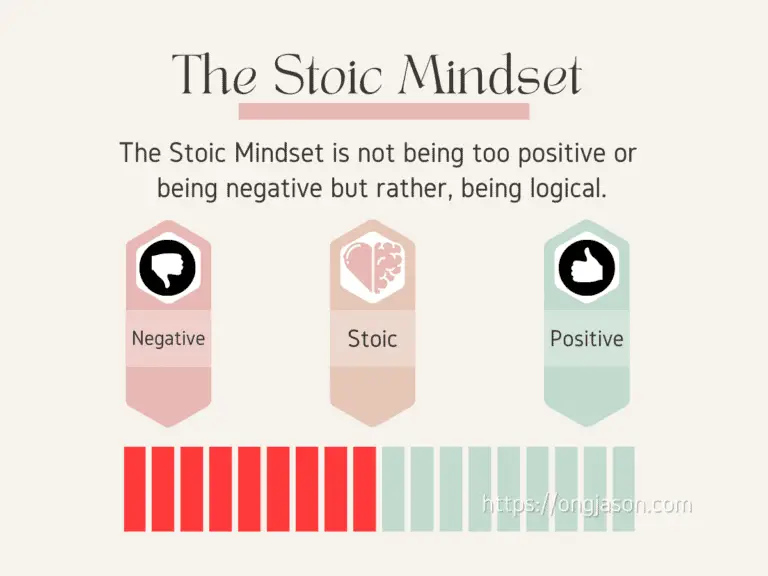Do Stoics Live a Happy Life? | A Simple Guide to Stoicism and Happiness
My dad is not a Stoic, but ever since I was young, he always taught me to accept things we can’t control. Instead of being annoyed by the things I can’t control, he taught me the importance of accepting reality. That philosophy stayed in my mind for a very long time until I was introduced to Stoicism. Little did I realize that his philosophy was an introduction to an ancient Roman philosophy about happiness.
As I was introduced to Stoicism, I learned a deeper meaning to happiness. Much more profound than what my dad taught me. Thus, I decided to compile all the basic principles of Stoicism in this blog post and answer if Stoics are happy.
Stoicism makes us happy by teaching us to be responsible for our happiness. Instead of relying on things to make us happy, Stoicism teaches us that there are things about happiness that we can control. This makes us empowered to be in charge of our happiness.

Are Stoics happy?
Stoics tend to be happy because they are taught to be responsible for their happiness. Stoics are taught not to rely on things they can’t control for their satisfaction. Instead, they are taught to rely on the things they can control as their source of happiness. That’s why stoics are focused on virtues since virtues are one of the things we can control.
As I said earlier, my father is not a Stoic. However, he is living the basic philosophy of Stoicism.
Lately, he suffered a stroke. However, what’s surprising to me is his resiliency and humbleness.
Although it is almost impossible to return to his former self, I can see how he accepted the fact and lives with what he has.
In short, despite the things that happened, he is living and contented with his life.
He might not be a Stoic, but he has lived his life following the basics of Stoicism.
If he was able to live contented despite the stroke using the basics of Stoicism, how happier are people who know the deeper sides of Stoicism?
Because of the way I was raised, I was a unique kid when I was in school. Despite failing some subjects, I am still smiling, telling everyone we can’t sell grades.
All of this while I am seeing some of my classmates break down due to failing grades.
When I realized I had lost my teaching job, I accepted the fact and quickly thought of ways to survive.
I grew up looking only for the things I could control.
I learned to accept life and be contented because of the basic Philosophy of Stoicism. When I deep diver into Stoicism, I learned more about happiness.
That’s also when I started to connect why I am a happy-go-lucky kid compared to other honor students.
Yes, I graduated with honors despite not caring for my grades.
This also explained why I didn’t felt like it was the end of the work when I lost my job.
Later, we are going to talk about what Stoics think of happiness.
For now, you’ve seen how the basics of Stoicism made me happy as a child, how I was different from other kids in school, and different from other adults who would lose their minds when losing a job.
Stoics are happy because they know how to be responsible for their happiness.
The key here is responsibility. That’s why I want to give you a brief introduction to Stoicism and happiness.
Everyone can learn from Stoics and be happier, even if the philosophy is about 24 centuries old.
By knowing how to be responsible for our happiness, we can be more resilient and live life with utmost satisfaction.
What is happiness according to the Stoics?
According to the Stoics, happiness is living according to your virtues. This is because your virtues are one of the few things you can control. That’s why the Stoics believe that instead of relying on things outside your control to be happy, you should be satisfied with living according to your virtues.
The basic philosophy of Stoicism is to accept things outside our control.
That’s why I only thought of finding a different job when I lost mine and why I am okay with failing grades in school.
This is because what’s finished is outside my control.
I lost my job. Then I have no choice but to move on. I failed in school, and the grade was final. There’s no way for me to change it.
If there is one thing I want you to get from Stoicism, there are many things outside our control.
The key to being responsible for our happiness is to associate happiness with things we can control.
That’s why I was able to be resilient. I know that I can’t get my job back, but I know I can find a way to survive.
Basically, we have no control over a lot of things that happen to us. We only have few things in which we can control.
But what are the things we can control? That’s where we go deeper into Stoicism.
To Stoics, what you can control are your virtues.
Many things that happen to us are outside our control, except our virtues. How we act despite the things that happen to us is reflected in our virtues.
Instead of explaining all virtues in one go, I decided to make it simpler for people who are still exploring Stoicism.
That’s why I made a basic guide below on Stoicism and happiness.
10 Easy Stoic Tips or Guide to Happiness
I’ve made this simple guide for people who want to know the basics of Stoicism and how it can aid in their happiness.
These tips will help you try the Stoic philosophy to see if the philosophy fits your current lifestyle.
1. Acceptance of things outside our control
There are many things outside our control. While many people force their way to get everything around them in control, Stoics believe that a lot of things we can’t control.
We don’t know what will happen tomorrow or what others will think of us.
For example: Why should we react badly to criticisms if we can’t control other people’s thoughts?
Isn’t that familiar in this age where Social Media is everywhere?
The basic concept of Stoicism is always to ask yourself if things are inside or outside of your control. If you can control it, then do something. If you can’t do something, then get over it.
Since I can’t control what others will say on social media, and whatever you do, there will always be criticisms, then let it be.
2. Focusing on the process and not on the outcome
One of the common misconceptions of people is that they can always control the outcome.
However, that’s not the case. We never know what the future holds.
Instead, enjoy and focus on the process.
It is my dream to make this website big. But, of course, I want that to be the outcome of my efforts.
But I know that the only thing I can control is the process. So that’s why I try to make blog posts since this is the only thing in my control.
So, focus on the process. Unfortunately, the outcome is something we can’t control. It is close to impossible to see what the future holds.
By accepting that fact, you won’t expect things. Since you aren’t expecting, you won’t be disappointed.
3. Feeling grateful for the things you have
Regrets are always in the end.
We all have things we can appreciate but don’t because we take them for granted.
For example, having food around your table is something you should be grateful for.
Suppose you have easy access to food. There are many people suffering from poverty and would like to have the life you have.
If you live comfortably in your house, many homeless people would wish for the life you have.
If you have a loving family, then a lot of people surely wish for that.
If you have a loyal partner, then many people also wish for that.
As you can see, there are many things we can be grateful for.
Stoicism teaches us to be grateful for what we have.
This is also why I made this video on my YouTube Channel.
In the video, I explained why I chose to have a boring life and why I’m happy with it.
The key point is that I learned to be grateful for the little things I have.
I make self-improvement videos on YouTube, and I gladly invite you to check my Channel to learn more about personal development. You can find my Channel by clicking here.
4. Reacting properly to emotions
It’s not true that Stoics don’t feel emotions.
The media tells that, but it’s a misconception.
Emotions are outside our control. We all feel happy, sad, joyful, disappointed, and many more.
Everyone experiences emotions. But what makes a Stoic different is they know they have control over how to react to those emotions.
For example, when you feel sad, you can start crying over it waste your day.
But you can also do something to fix the problem, or you can do something productive instead.
The basic principle of Stoicism is that we don’t have control over the emotions we feel, but we have control over how we react to these emotions.
That’s why they see Stoics as people who aren’t emotional. But that’s not true.
Stoics learned how to react to emotions because they knew they could control their reaction to these emotions.
5. Staying logical
This is part of reacting to emotions.
Stoics know that being too emotional harms our logical thinking.
For example, if you’ve been impulse buying, then that’s acting based on emotions.
Stoics know this, and they don’t do any action if they realize they’re too emotional.
Thus, they wait for the time they become logical to always make an informed choice.
6. Focusing on the present moment
We don’t control the future. There are too many variables that can change, which we can’t control.
That’s the same with the past. Since it already happened, we can’t change the past.
That’s why Stoics teach to care for the present, and by that, they mean the only thing we can control is the present.
That means work for your future, but remember to focus on the process instead of the outcome.
7. Accepting criticisms
People’s opinions are outside our control.
For example, no matter what you do, there will always be people who hate you for being yourself.
That is a part of life.
This is also the reason why Stoicism is now becoming famous.
Because of the rise of social media, you can see a lot of hate on the internet.
Since everyone can see us, it is common to see people that hate us.
For Stoics, criticisms are outside our control. So why bother?
8. Accepting the things that already happened
As I said earlier, the past is already the past.
We all made mistakes. I also made a lot of mistakes.
We can’t change those mistakes. What we can control is to react to those mistakes.
What we can do is to learn from these mistakes and never do it again.
9. Virtue is important
Stoics believe in 4 virtues.
This is an advanced level of Stoicism, but I still need to include it here.
Since Stoicism is focused on the understanding that virtue is one of the little things we can control, they suggested having these virtues to live a happy life.
Here are the 4 Stoic Virtues:
- Wisdom – Knowing the good and the bad
- Justice – Having moral wisdom and acting in fairness or impartiality
- Temperance – Keeping things in moderation, self-control, and awareness
- Courage – Having the grit, bravery, and resilience
The four Stoic Virtues are wisdom, justice, temperance, and courage. Wisdom is focused on knowing the good and the bad. Justice is having the moral wisdom to act in fairness. Temperance is keeping things in moderation and having self-control, and courage is having grit and resilience.
10. Be contented and want less
Many people believe that more is always better.
That’s why you can see marketing hype telling you that this small thing will solve all your issues, or you just need this one thing to have a happy life.
The truth is, more does not always mean better.
Stoics believe in the hedonic treadmill in which people adjust to what they have.
That’s why you will see rich people who would chase a lot of money without satisfaction.
For them, they are adjusted to earning a lot of money.
Stoics believe that contentment is a key to happiness. They think that chasing a lot of things will only lead to stress and dissatisfaction.
That’s why one of the virtues of Stoicism is temperance.
What’s next? If you’re interested in modern Stoicism, I’ve made an article explaining what happened to Stoicism to the modern one. This will help you understand more about what the Stoic philosophy is. You can find my blog post here: Are there Stoics in the Modern Era?

“Only the things I love.“
ongjason.com is reader-supported. When you buy through links on the site, I earn an affiliate commission.
If you’re following me, you’ll know that I believe it is essential to have some tools, whether it’s for personal development or lifestyle in general.
So, here are the things I love.
YouTube
If you want to learn things for free, I recommend watching my YouTube Channel. Click the Button Below to go straight into my Channel. 🙂
Okay, let me first explain my Channel.
I believe that I really can’t explain everything too well on my blog. That’s why I created a YouTube Channel so I can easily explain a lot of things. Plus, I believe that Video Sharing is the future.
Recommended Books
The next thing is books. Books are, for me, one of the cheapest ways to get invaluable information. We can learn personal development, finance, career, relationships, and many more from books.
Here, I will be listing my favorite books in different categories.
- For Beginners – 7 Habits of Highly Effective People by Stephen Covey – Personal development has a lot of concepts and ideas to learn. Thus it can be really hard for beginners to know where to start. Thus, I recommend this book since all the basic concepts of personal development are here(except finance, check what I recommended for that)
- Productivity – The One Thing by Gary Keller – This book teaches us the power of focusing on one thing which is the ultimate source of productivity. The concepts taught are what I am using to constantly publish YouTube videos while maintaining this website.
- Busy? – Make Time by Jack Knapp – This book teaches us how to make time for the things we love. The concept is really simple but I think that makes it a book worth reading.
- Health – Lifespan by Dr.Sinclair – This Book teaches about the latest scientific research on lifespan. In his book, he has shared numerous things he is doing to slow down his aging process. This can be as easy as eating less which he recommends.
- Finance – The Richest Man in Babylon by George Clason – Perhaps one of the first books I’ve read about Finance, this book for me is the best if we are talking about learning basic finance such as basic saving and investing. The concepts are very simple but effective.
Audiobooks
Take this advice as a grain of salt.
I don’t recommend buying Audiobooks one by one. I mean, audiobooks can be quickly finished by listening while working out or doing some mindless tasks.
So here is to save you some money. Just go for a monthly subscription to Audible. I believe that you will save a lot of money with that plus, they usually give freebies to anyone starting.
My Audiobook Recommendation will always be the same as my book recommendations, but I personally like The 5 Second Rule by Mel Robbins. I like how she is so casual while reading her book.






